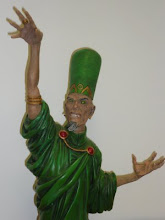 On October 26 1440 Gilles De Rais was executed and the legend of Bluebeard began, while Bluebeard killed his wives, Gilles De Rais was a sadistic child abuser and killer. Jean Benedetti traces the extraordinary arc of his life from being one of the richest men in France, if not Europe, a respected and successful soldier to a tasty morsel for ruthless and ambitious men who used his crimes as the cover to to gain what was left of his lands.
On October 26 1440 Gilles De Rais was executed and the legend of Bluebeard began, while Bluebeard killed his wives, Gilles De Rais was a sadistic child abuser and killer. Jean Benedetti traces the extraordinary arc of his life from being one of the richest men in France, if not Europe, a respected and successful soldier to a tasty morsel for ruthless and ambitious men who used his crimes as the cover to to gain what was left of his lands.Gilles De Rais was born to be the solution to a knotty problem of inheritance, he was the heir to three very significant fortunes and the resolution to to struggle over their future. The most significant figure in Gilles De Rais' early life was his grandfather, Jean de Craon, the man who engineered the complex transactions that lead to Gilles being the final heir to three fortunes. Gill raised by his grandfather after the death of his parents, as a typical French aristocrat. The Hundred's Year war was raging between France and England and France was not a nation in any meaningful sense, it was a collection of frequently feuding regions with no effective centre.
Gilles De Rais fought with Joan of Arc at Orleans, he was an ardent follower of her at the time, they both favoured aggressive action against the English. He did not pursue a career as a soldier or political leader, rather he retreated into a secret life that revolved around kidnapping, abusing and killing children.This gradually consumed his life and his fortune until his erratic actions provided the excuse needed to arrest him and seize his remaining lands. Gilles made a detailed confession at his trial and was hanged and his body burned.
Jean Benedetti places the life and actions of Gilles De Rais into the context of his times and does so in a gripping and very thoughtful way. Gilles was born into power and privilege and never had anyone seriously challenge his right to do whatever he wanted. he was alive, his grandfather was a limit on him,mostly to prevent Gilles spending the fortune Jean de Craon had so painstakingly created. With his death the last effective restraint on Gilles was removed. His child abusing and killing was not his greatest crime for his fellows, it was the reckless way he reduced his fortune and betrayed the requirements of inheritance.
This book is written with confidence and a sharp turn of phrase, the section on Joan of Arc is thoughtful and happily considers her in the political context of the time and gives her the full due of erratic importance she deserves. The spiral into obsession and debt that marked the second half of Gilles De Rais life is traced and assessed with care. Jean Benedetti is clearly intrigued by Gilles De Rais but never overwhelmed by him. This is a vivid and very enjoyable book about a dreadful man, thoughtful and never sympathetic it tries to explain but never excuse. A great read.




